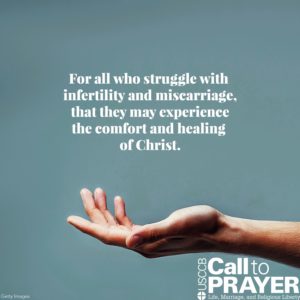 Catholic Marriage: Infertility vs. Impotency
Catholic Marriage: Infertility vs. Impotency
I’ll admit it: at one point, I was confused about the Catholic sexual ethics of infertility. On one occasion, I was having coffee with a secular friend who asked me all kinds of questions about what married couples could and could not do, Josephite marriages, the difference between infertility and impotency, and even bizarre hypotheticals like “what if one of the spouses developed a disease that made having sex fatal for six months?!” While I can’t promise that this post will answer that last question, hopefully it will make the Church’s teachings on impotence and infertility a bit clearer.
The Catholic Church teaches that those who are impotent—that is, those who are incapable of having sexual intercourse—cannot marry. (I know, to the modern ear, like my friend, this might sound odd and even harsh). Because procreation and unity are the two natural ends of marriage, and because both of these ends are fulfilled in the sexual embrace, it follows that the sexually impotent cannot marry. As per the Code of Canon Law No. 1084, §1: “Antecedent and perpetual impotence to have intercourse, whether on the part of the man or the woman, whether absolute or relative, nullifies marriage by its very nature.” By “antecedent” and “perpetual,” it is meant that one cannot be impotent either before marriage (antecedent) or permanently during marriage (perpetual);[1] this means that one is considered impotent if they cannot have intercourse at all or if they cannot have intercourse specifically with his or her spouse.
It is important, however, to clarify what being impotent does not mean. Impotence is not infertility. While impotence means the inability to have sex, infertility means the inability to conceive children. Thus, impotence and sterility/infertility are not the same. The Church does not consider infertility as an impediment to marriage, and married couples who suffer from infertility have marriages just as natural and valid as those who are able to conceive children.
But one might object: how can an infertile couple fulfill the procreative end of marriage if they cannot conceive children? In answer to this question, the Church maintains that a couple can be infertile but nonetheless remain open to life.  How can this be, knowing that their marital embrace will not result in conceiving a child? If we remember back to our earliest posts on the meaning of nature, we established that human beings possess a distinct human nature, one impulse of which is an inclination to procreate. Like all mammals, human beings are endowed with the complimentary sex organs in order to carry out this task. These sex organs have an end or a purpose: to facilitate procreation.
How can this be, knowing that their marital embrace will not result in conceiving a child? If we remember back to our earliest posts on the meaning of nature, we established that human beings possess a distinct human nature, one impulse of which is an inclination to procreate. Like all mammals, human beings are endowed with the complimentary sex organs in order to carry out this task. These sex organs have an end or a purpose: to facilitate procreation.
Sometimes, there is a defect in the sex organs that makes the fulfilling of this end impossible: if the sex organs are constructed such that a man and a woman cannot properly unite, then this would be a case of impotence. However, sometimes the impediment is not due to the functionality of the sex organs, but due to other factors that make conception impossible. In other words, if a couple is capable of having intercourse, then they are still capable of using their sex organs for their natural purpose, even if they know that the procreative end of the sex organs cannot be achieved.
We encounter these kinds of scenarios in our day-to-day lives all the time. For instance, it does not betray the natural end of the digestive organs to eat one when is not hungry. I can enjoy a piece of cake even if I know it won’t nourish me because eating in general is the natural function of my digestive system. The fact that my body is not nourished by the cake does not mean I have done something wrong. However, imagine now that I eat an inordinately large portion of cake for the express purpose of purging it later. This would be an abuse of my digestive organs, if I intentionally used my organs for a purpose contrary to their nature.
In this way, couples who affirm the natural end of the sex organs while struggling with infertility are nonetheless open to life despite for some reason not being able to have children. They do nothing to make intercourse sterile but give themselves to each other as they are. By having intercourse, the couple affirms the natural end of procreation in itself. They affirm that the sexual embrace between husband and wife is naturally designed for the procreation of children. We can think about it this way: an infertile couple may know with almost complete certainty that they will not conceive a child. But the infertile couple is still open to life in the sense that if, against all odds, sexual intercourse did lead to conception, the married couple would be open to this new life. Why? Because this is what sexual intercourse was designed to do.
 This is also the same logic behind Natural Family Planning. Unlike the couple suffering with infertility, a married couple may decide that a certain time is not practical for conceiving a child, so they reserve intercourse to the infertile time when conception is unlikely. However, the married couple is still open to life in the sense that if they were to conceive a child during this time, they would nonetheless be open to children. They do nothing to sterilize an act of intercourse by abstaining from sex at that time.[2]
This is also the same logic behind Natural Family Planning. Unlike the couple suffering with infertility, a married couple may decide that a certain time is not practical for conceiving a child, so they reserve intercourse to the infertile time when conception is unlikely. However, the married couple is still open to life in the sense that if they were to conceive a child during this time, they would nonetheless be open to children. They do nothing to sterilize an act of intercourse by abstaining from sex at that time.[2]
Again, couples that struggle with infertility are no less open to life than couples who have no problem conceiving, and their marriages are no less valid or fruitful. As St. Pope John Paul II said in a message to infertile couples in a 1982 homily, “You are no less loved by God; your love for each other is complete and fruitful when it is open to others, to the needs of the apostolate, to the needs of the poor, to the needs of orphans, to the needs of the world.”[3]
In our next post, we will continue to discuss infertility and the licit methods for treating it. We will see that some methods of treating infertility, even certain technological ones, are perfectly licit, while others are gravely immoral.
______________________________________________________________
[1] By the way, this comment is merely a logical distinction. It in no way affirms that people ought to have sexual intercourse before/outside of marriage.
[2] The same logic is behind Josephite marriages (an extremely rare example). If a married couple decides (together!) that they are called to abstain from intercourse, this does not render their marriage invalid, since they are still capable of having intercourse and are thus open to life. The Josephite couple recognizes and affirms the natural end of the sexual embrace, and it is still an integral part of their marriage even if they are not actively trying to conceive children
[3] Pope John Paul II, “Homily at the Mass for Families During the Apostolic Pilgrimage to Nigeria, Benin, Gabon and Equatorial Guinea” (Rome, 13 February 1982) http://www.vatican.va/content/john-paul-ii/en/homilies/1982/documents/hf_jp-ii_hom_19820213_onitsha-nigeria.html
About the Author: Bridget Groff is an M.A./Ph.D. student in the School of Philosophy at the Catholic University of America. She currently works part-time at the United States Conference of Catholic Bishops as an intern for the Subcommittee for the Promotion and Defense of Marriage.
Archive
Made for Love Ep 58: Love in the Time of COVID
In this pandemic, it is more important than ever to love one another! Today’s episode features Amy Stout (and family), Sarah Engel, Fr. Dan Leary of the Archdiocese of Washington, and Jason Kidd, Marriage and Family Life Director in the Archdiocese of Portland, Oregon. This is also the last episode of Made for Love for now, as Sara Perla is leaving for another adventure! Thanks for listening!
On Podbean:
Or Soundcloud:
